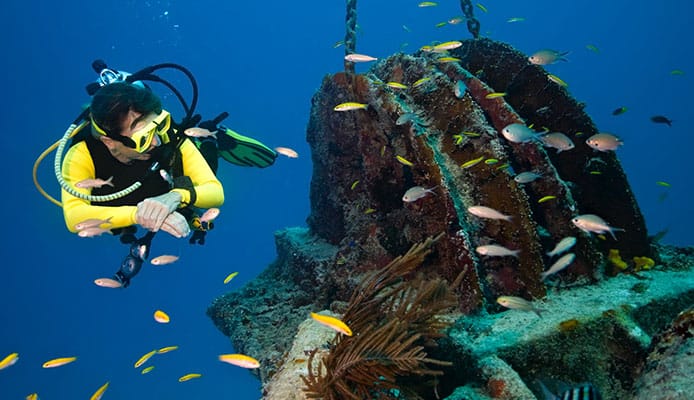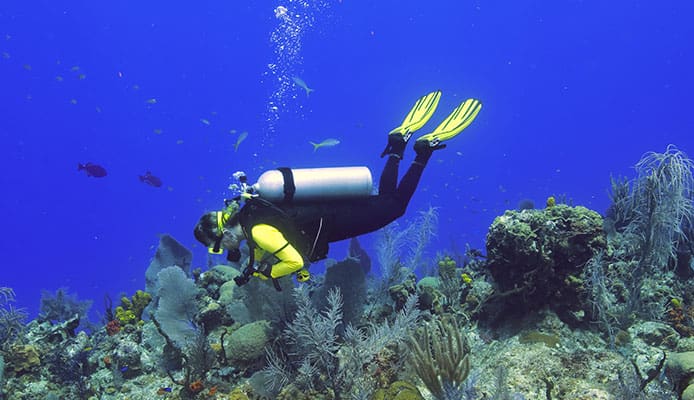
Many people may not be aware of this, but an object experiences more buoyancy in saltwater than it is in freshwater. Two forces come into play when an object is dropped in water. There is the weight of the object which is equal to the downwards force and the upwards force which is the weight of the displaced water.
At any one time when an object enters the water, these two forces are playing their part and will cause either one of three things—the object will float, the object may sink or the object may become suspended in the water.
If you are a scuba diver then having the right scuba gear package is key. Extra gear such as dive watches is also very helpful as they help confirm the readings from the other gear. We will look at buoyancy and scuba diving as we understand more.
Three main terms are used to describe the buoyancy of an object. Negatively buoyant means that the object will sink. Its weight is more than the weight of the displaced water.
An object could be positively buoyant. In this case, it will float. This is due to the weight of the object being less than the weight of the water that is displaced.
If the weight of the object is exactly equal to the weight of the water displaced, then the object becomes suspended in water and it will become neutrally buoyant.
Saltwater vs Freshwater
Saltwater is heavier than freshwater due to the simple fact that it has salt dissolved in it. One cubic foot of seawater weighs roughly 64.1 lbs. An equal amount of freshwater will weigh 62.4 lbs.
The density of the water when salt is added will change to create an unusual bond that results in a saltwater molecule. The water density thus increases. Look at it this way…If you were to add a cubic inch of salt to a cubic inch of water, will this increase the volume of the water by a cubic inch?
No, it will not!
This is because the water molecules will pack themselves even tighter around the salt. They are held closer than they normally would be held in freshwater. Thus, when you add a cubic inch of salt to the water, the water density will increase by less than that cubic inch.
Simply put, there are more molecules in a cubic inch of saltwater than there are in a cubic inch of freshwater which causes saltwater to weigh more.
When we go back to Archimedes’ principle that states that the upwards force is equal to the volume of water displaced by the object when dropped in the water since saltwater is denser or weighs more than freshwater, the volume displaced will weigh more than the volume of freshwater if the object was to be dropped in freshwater.
The upwards force in saltwater will therefore be greater. If the object displaces 62.4 lbs. in freshwater, the same object will displace 64.1 lbs. in saltwater.
Moving From Freshwater To Saltwater
First of all, if an object experiences neutral buoyancy in freshwater, it will float when it is moved to saltwater and become positively buoyant. This is because the weight of the water displaced is equal to the weight of the object in freshwater. When dropped in salt water, the weight of the water displaced is more than the weight of the object which causes it to float.
But what if you placed an object that is showing neutral buoyancy in saltwater and placed it in freshwater? The simple answer is that it would sink. This is because while in salt water, the water displaced is equal to the weight of the object. When dropped in freshwater, the weight of the water displaced becomes less than the weight of the object which will cause it to sink.
In the case of a scuba diver, the diving regulator will help manage his buoyancy but we shall look at this later on.
Simply put, when an object is taken from fresh water and placed in saltwater, it might sink or float depending on the weight of the object and the weight of the water displaced. However, the constant is that the upward pressure in saltwater is more than in freshwater.
How About A Scuba Diver?
Based on the science above, you can predict what would happen to a diver’s buoyancy in saltwater when he moves from freshwater.
The same principle applies. A diver will experience more of an upwards force in saltwater than he would in freshwater. This means that the diver should take action to adjust the weight he is going to carry. He will need to carry more weight in saltwater and less weight in freshwater.
Depending on his goals the diver may want to get to the bottom of the ocean. A good pair of dive boots will help keep his feet safe from sharp rocks and objects.
There are several other factors that the scuba diver will need to keep track of when determining just how much weight to carry. For example, he needs to know his own weight, scuba tank weight, dive equipment as well as exposure protection.
The equipment should always be in top form and one of the ways of ensuring this is to use dive bags for protection.
All these contribute to the diver’s total weight and thus the downwards force he exerts on the water. Sometimes the diver may need to change his wet suit or dry suit depending on his chosen diving location and type of water. The amount of upwards force that he experiences will depend on all these factors.
The diver will also need to consider the water salinity and water displacement.
One of the main ways that the diver can determine his overall buoyancy is through a buoyancy test whenever he changes from freshwater to saltwater or vice versa. The diver may need to increase his weight to double when moving from saltwater to freshwater.
Always when diving it is a good idea to make use of smb for scuba diving so that other people know where you are diving. In the case of a rescue scenario, it will make it easier to locate you.
Other Factors To Consider
Remember what we said about changing the weight based on the chosen diving location? Well, the salinity of ocean water is not constant across the world’s oceans and seas. Some areas are more saline than others. Of course, the saltier the water the more buoyant the diver.
We saw that a cubic foot of saltwater weights 64.1 lbs. on average. However, in some locations such as the dead sea, the water weighs a whopping 77.3 lbs. per cubic meter.
Another factor that determines the buoyancy in freshwater or saltwater is the water temperature with cold water being denser than warm water.
Often dive sites will have a diver move across the different thermoclines or different layers of temperatures as well as the different layers of salinity. As he does so, he will notice changes in his buoyancy.
Always ensure you are wearing dive gloves to keep your hands warm in the cold water.
You might also like: Scuba Phobia: 10 Ways To Get Over Your Fear Of Scuba Diving
Swimming In Freshwater vs Saltwater
While we have established that saltwater leaves a swimmer or diver more buoyant, is it easier to swim in saltwater, or is it easier to swim in freshwater?
Experts agree that since you will be nearer to the surface in saltwater, it is easier to swim in it than it is in freshwater since you will be sinking deeper and experiencing more drag.
The shape of the swimmer’s body however will also determine how buoyant they are. People with more fat are naturally more buoyant since fat is less dense than water. More muscular people are more likely to sink deeper than people with fat since muscle tissue is denser than water.
That said, it’s important to keep in mind that the body is 80% water so, in a relaxed state, you are more likely going to float than to sink.
If you are open to low light dive scenarios, then having the right gear is essential one of which are good underwater dive lights.
Globo Surf Overview
Fresh water and saltwater are completely different realms that require the diver to make certain adjustments in their weight to better move through the watery world. It is the salt that makes the difference between the two different water bodies. It causes water molecules to compact tightly around the salt molecules which means more water molecules in saltwater per cubic cm than in freshwater.


